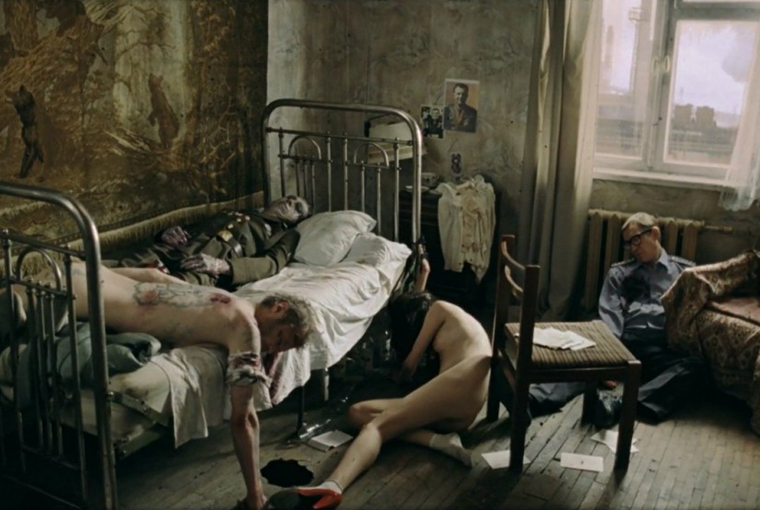Guilt of the Public
Aleksei Balabanov’s Cargo 200 (Gruz 200, 2007)
Vol. 6 (June 2011) by Konstanty Kuzma
Aleksei Balabanov’s Brother from 1997 is widely considered the first post-modern Russian film from the new generation of Russian filmmakers. It tells the romanticised, mildly patriotic story of a young man full of idealism who comes to St. Petersburg to find his brother, and leaves the city broken by reality. Brother clearly hit the nail on the head when it comes to the atmosphere of Russia in the late 1990s. In spite of its unripe style, the film vividly illustrates the fate of a young man trying to survive in a world with no rules, making it a major success in the domestic box-office. Backed by the popularity of the film both in and outside of Russia, Aleksey Balabanov has since directed 8 features that are often set in the colorful Russian crime world – among them a sequel to Brother. Although it is also a crime that lies at the heart of Cargo 200, this film is set far from the urban mafia world of Russia, and based on real events…
In Cargo 200, a mentally disordered Soviet police man (played by Aleksei Poluyan) kidnaps a young woman and brings her to his flat where he rapes and humiliates her. The film opens with a dialogue between two brothers, a Colonel and a university professor, who discuss their lives – an inconspicuous conversation about family, work and politics (it is typical for Balabanov to start with such an unrelated event). As fate wants it, both brothers have a link to the event that happens that night. Valera, the colonel’s daughter’s boyfriend, disappears that night. He goes to a club where he takes out Angelika (Agniya Kuznetsova), a friend of his girlfriend. When they drive to a farm near town to get alcohol, Valera passes out drunk, leaving Angelika in the hands of strangers. While the owner of the farm is interested in Angelika, his wife Antonina saves her from him, hiding her in the barn. But Captain Zhurov, the mentally disordered police man, finds her and takes her with him. At this point, Zhurov is not introduced to us as a police man and his presence on the property is rather incomprehensible (later in the film we find out that he and the property owner have been in prison together).
While the first half of the film evolves with panting tension, the second half turns into a into a slow, nerve-thrilling trip. Zhurov takes his victim to his flat, and the audience has to bear through the various humiliations Angelika is exposed to. In spite of his cruelty, we begin to feel sorry for Zhurov as we realize the severity of his mental disorder. Still, the tension is now concentrated on the hope that Balabanov will set an end to Zhurov’s acts that augment in their perversity. The relief finally arrives when Antonina avenges her husband who goes to prison instead of Zhurov because of a previous agreement that is not further elaborated. She shoots Zhurov in his flat, and even if she does not release Angelika from her hand cuffs to fulfill the symbolic release, the tension slowly decreases…
Cargo 200 takes place in 1984 during the Soviet-Afghan war. The title refers to the corpses that had to be shipped from Afghanistan to Russia in the course of the 9-year-long fighting, but the war is only a minor subplot. Like in Fritz Lang’s M (1931), we must first understand the microcosm – the acts of a mentally disordered man – as a reflection of the the system, before we can look for a connection between the story and its setting. In Cargo 200 (like in M), the culprit is himself a victim (perhaps the only noteworthy feature to his character that is otherwise rather plain), but there is more layers to guilt in this piece. It is the public as much as the state that allowed the crime to happen. Even Antonina, who in the beginning, seems to be the only person determined and capable enough to help Angelika, doesn’t fully obstruct the crime, and it is thus understandable why Balabanov did not want to retell the story in current Russia. It is Valera who takes out Angelika from the night club and passes out drunk without bringing her home, it is the professor who flees the scene of crime instead of bearing witness, but it is likewise the state that allowed Zhurov to work in spite of his mental state.
But if we approach cinema as a medium, the audience takes up its place in this guilt constellation too. One of the most provocative rape scenes can be observed in Gaspar Noé’s Irreversible (2002), where Noé forces us to watch the entire act from beginning to end without cuts, camera movement, or music. Of course, primarily, we perceive ourselves as a victim, an involuntary observer who is forced to bear through the sufferings of a character we identify with. But doesn’t cinema also turn us into culprits? The arousement and the sexual tension are never fully exterminated by the awareness of wrong-doing. The fact that we perceive ourselves as observers of a fictional event seemingly entitles us to remain observers, and, in the logic of the film, to enjoy the cinematic experience. For a viewer, there is no possibility to step out of the action, he is forced to give in to his emotions. This element is clearly represented in Cargo 200, too. When Zhurov feels that he is not capable of satisfying his victim himself, he brings in a colleague and observes their coitus (there is another scene where Zhurov watches his colleague beat up a prisoner, asking him not to beat him in the genitals, as if trying to preserve potency as an abstract idea). With these images, Zhurov steps out of the action and becomes an observer – like ourselves. In Cargo 200, it is not just the action that is disturbing, but the fact that we are forced onto the same level as the characters in the film, who do nothing but observe. Even Zhurov himself is never seen having sex with his victim (except for a short sequence when he rapes her while watching TV), creating a disagreeable parallel with the audience experience.
Such a serious subject is not the only face of Balabanov – although here, too, there are traces of dark humor. In 2004, Balabanov directed Dead Man’s Bluff, a dynamic crime comedy that follows the fate of two dumb criminals who get caught up in shoot-outs and endless plot twists, starring Nikita Mikhalkov as an off-key mafia boss. In fact, the film satirizes the crime world in a fashion very reminiscent of Quentin Tarantino’s or Guy Ritchie’s work. However, the pretense of Cargo 200 is different of course. Here, we are not simply entertained, but confronted. Cargo 200 seems to be more mature than Brother in that it sacrifices the popular, idealistic tone of Balabanov’s earlier films for a serious manner, even though the latter may be less enjoyable. If, in that case, Balabanov is aiming at social critique, it is justified to ask whether the audience will accept Cargo 200 as a critique of today’s Russia too, or whether the critique of today’s reality is fully obscured by the curtain of time…




The Russian film „Cargo 200” [original: „Gruz 200”, director Alexei Balabanov] is a shameless plagiarism.
Its plot is an exact copy of the novel „Sanctuary” by William Faulkner. The book was adapted to the grim years of the late Soviet reality from the original location in the US deep south in the beginning of the 20th century. The sequence of events is abosolutely the same. The black worker from the American farm has been replaced by the asian helper in rural Russia, instead of the daughter of the American judge we have the daughter of the communist party officer, American student was simply replaced by his Russian counterpart, Popeye became a Soviet militiaman and so on, and so on. The sole character invented by the director Aleksei Balabanov is the dead body of a Soviet soldier killed in Afghanistan.
Faulkner was awarded the Nobel prize in literature for the „Sanctuary”. Balabanov hopefully hasn’t won anything outside Russia and let it remain so. I belive it shall.
Director Balabanov did wrong. Artists are authorised to change, to shorten or to extend the original plot, to add characters or to move the scene to another location or time. Just one stipulation. They have to inform the public what the screenplay is based on. So little and so much at a time.
In the very beginning of the film „Cargo 200” the spectators are informed that it was based on facts which had really happened.
It is a lie. Balabanov concealed that he had copied the Faulkner’s idea. Page by page, scene by scene, character by character. That’s enough to call his film a plagiarism and its director a liar without honor. The proper place for him and his masterpiece is in a junkyard. Without this one sentence long inscription in the beggining everything might be o.k.
We should feel sorry for all those who took part in this mascarade and were not aware what was really going on. Actors, cameramen, literary whole the staff wasted time and now should be ashamed that they participated in this scum. „Cargo 200” ought to be forgotten forever.
Personally I am outraged by Balabanov’s assumption that people watching his film are retarded rednecks. It’s a proof of the director’s Soviet mentality perching in his brains. He even can not imagine that his film may be seen by someone who’s familiar with the book of the Nobel prize winning novelist. And thus he feels free to use someone else’s idea.
The conclusion? It is not enough to wipe the once biggest country from the world map, to change frontiers, to change social and economic system. Homo sovieticus shall survive. Like a cockroach.